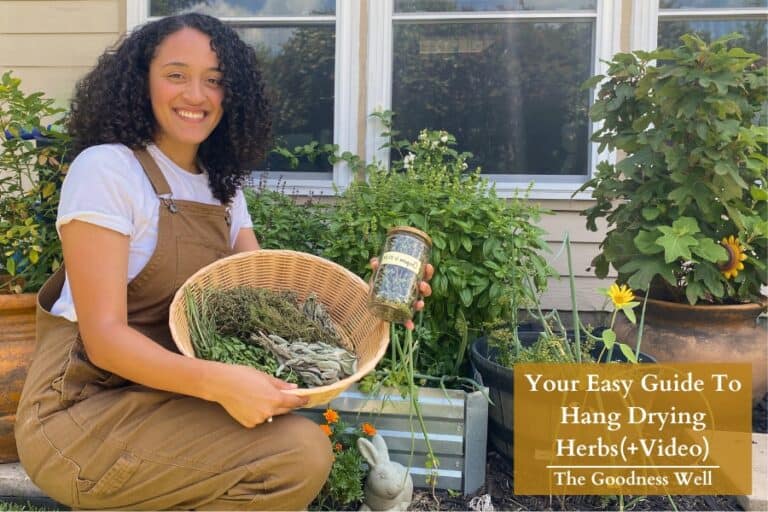100 Ways To Live More Sustainably | Simple & Practical Tips

Are you on the hunt for ways to live more sustainably?
We got you covered.
Since adopting a simpler way of living, we’ve learned a bunch of ways that help us save money, cut down on toxic chemicals around us, and cut down on waste.
And our learning journey doesn’t stop there; we continually update this list with new things we learn!
There are so many benefits of living this way and it’s more than worth it, trust me.
Let’s get into it!
We are reader-supported. So some links in this post may be affiliate links, which means we may earn a small commission if you make a purchase. Learn more
100 Ways to Live More Sustainably ♻️
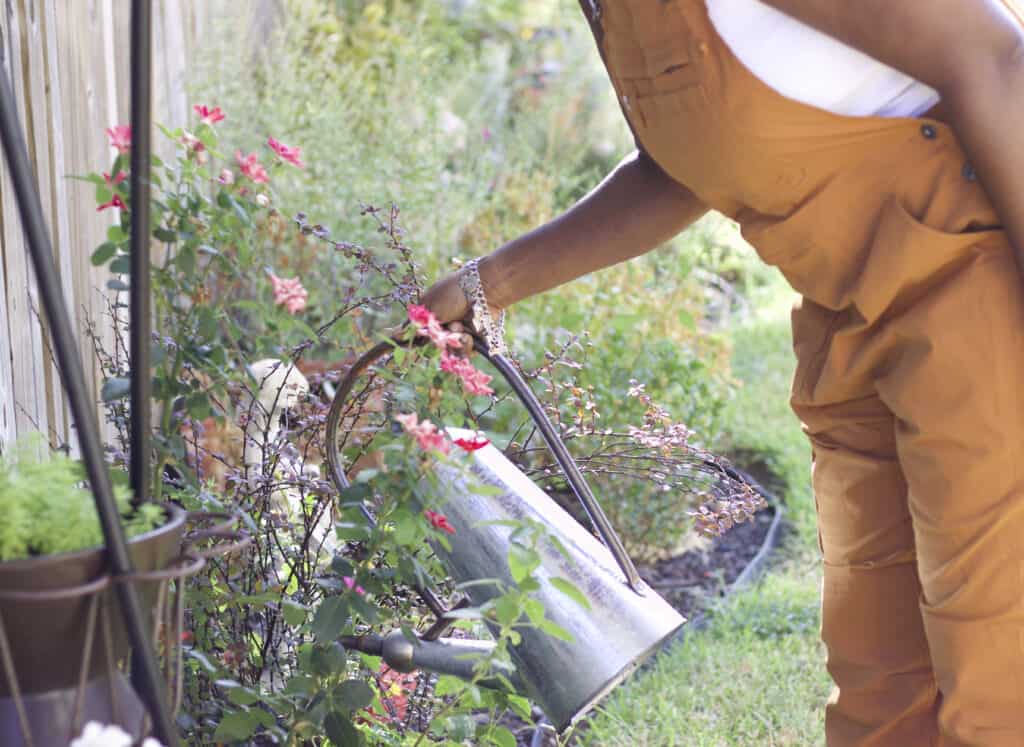
Much of this list involves easy ways to go green and be more sustainable at home and outside the home.
From eco-friendly shopping tips and tricks to other random ways to be more eco-friendly, we’ve brought you our all-encompassing list.
In The Home 🏡
Saving Water

1. Aerated faucets: Faucets equipped with aerators can reduce the flow of water, saving water without compromising pressure.
2. Dual flush toilets: These toilets have two flush options – a half flush for liquid waste and a full flush for solid waste, reducing water use.
3. Water-saving showers, dishwashers, and washing machines: Choose appliances that are designed to use less water. Just look for products labeled with the WaterSense logo below.

4. Rain barrel if you have a garden: Collect rainwater for garden use which reduces the need for tap water.
5. Take showers and not baths: Showers typically use less water than baths. Baths gross me out a little anyway.
6. Switch to a Low-Flow Showerhead: This can save water without compromising pressure.
7. Turn off the water when brushing your teeth: This simple habit can save gallons of water over time. This one is for you too especially, kiddos!
8. Run dishwashers and washing machines on economy settings: Economy settings maximize water efficiency (and wash your clothes in cold water!)
9. Only use washing machines and dishwashers when you have a full load: Running these appliances only when full to maximize water use.
10. Stop the long showers: For those of you who take extremely long showers or leave the water running way too long before you actually get in, stop it (guilty in the past of this myself).
11. Don’t leave faucets running: Only use water when needed.
12. Dishwasher over handwashing: Using a dishwasher to wash your dishes uses less water than handwashing. This one will be hard to accept for the old-school folks but it’s true!
Saving Energy
Here are some energy-saving tips to lower that high electric bill!
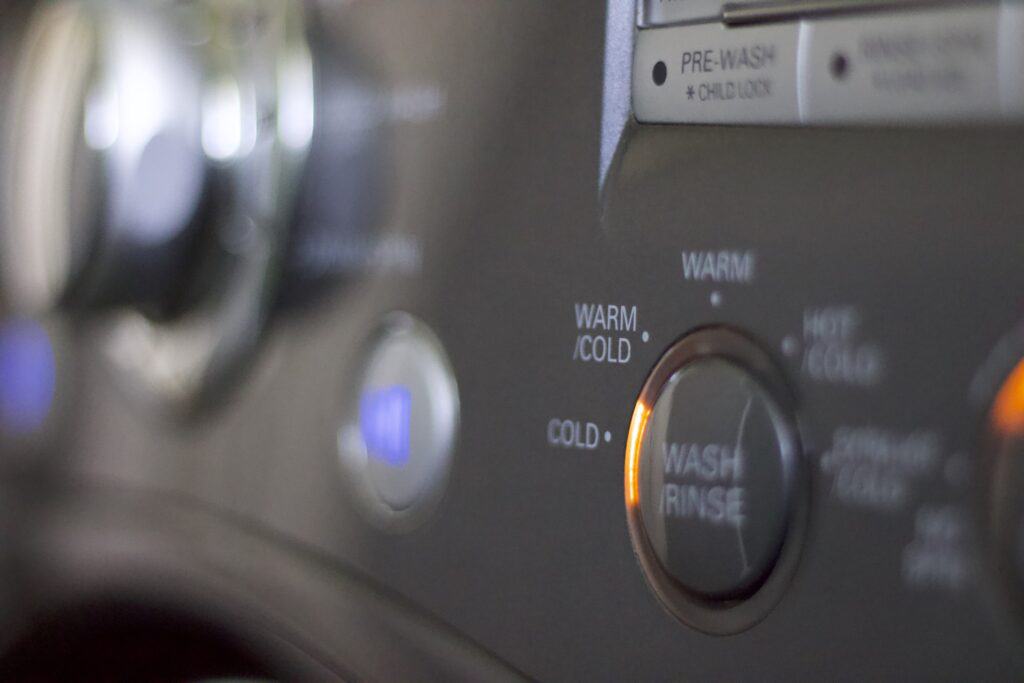
13. Wash Clothes with Cold Water: Washing machines use a whole lot of energy just to heat up water. Washing with cold water also prevents color fading and helps prolong the life of the material.
14. Dry clothes outside for free: Your free dryer is right outside! Just simply hang on a clothesline. Avoid if you are an allergy sufferer.
15. Buy your electricity from green energy providers: Support energy-efficient technology sources like wind or solar. Our solar panels have saved us a ton of money!
16. Use pressure cookers: They’re energy-efficient and cook fast.
17. Avoid opening the oven door too much while baking: This makes your oven work harder and wastes energy.
18. Replace old water heater: If it’s 15 years or older, you should look into replacing it. Newer models are typically much more energy efficient.
19. Turn your heating down by one degree: Just turning down the thermostat can save significant energy. Throw on a hoodie and some sweats and get comfy!
20. Turn the heat down before you go to bed: Not only does lowering the heat lower your electric bill, it helps you sleep better. Research says we sleep best in 60-68 degrees.
Research also says people who can sleep with the thermostat close to 80 might be aliens (not really).
21. Pull down curtains at night: This prevents heat loss.
22. Make old radiators more efficient: stick foil to pieces of cardboard and place them behind the radiator on the walls. This way it reflects the heat, and the radiator heats your room and not the walls.
23. Insulate pipes in a cold attic to reduce heat loss: This can prevent heat from escaping and thus reduce energy usage.
24. Draft-proof your home: You would hate to heat or cool your home just to have that air escape through small gaps. Weatherstripping doors and windows can prevent heat loss and save energy.
25. Maximize Natural Light: Draw up the curtains during the daytime when possible. Maximizing natural light can reduce reliance on electric lighting.
26. Use low-energy light bulbs: Switching to LED bulbs can use up to 90% less energy and last 25x longer than regular bulbs.
27. Turn off electric items when not in use: Leaving a computer, TV, or other electronics on for a little while can cost as much as leaving a couple of light bulbs on all night.
28. Use Renewable Energy Sources: Consider installing solar panels or a wind turbine to generate your own electricity. Solar panels on our home have saved us a TON.
29. Buy Energy Star-certified equipment: These devices meet strict energy efficiency guidelines set by the EPA.
30. Install Solar Outdoor Lighting: Solar lights charge during the day and illuminate at night, saving energy.
31. Use a Programmable Thermostat: This can help save energy by adjusting the temperature when you’re not home.
Reducing Waste
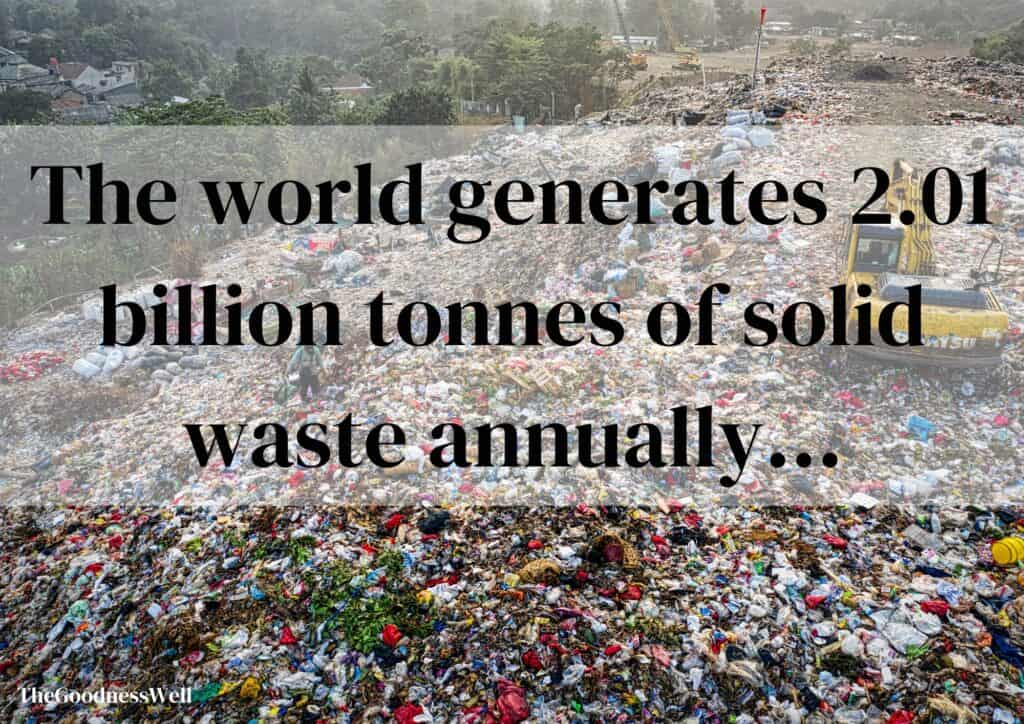
32. Install a Tap Water Filter: Drink filtered tap water instead of using plastic bottles. Research shows plastic bottles have a 1,400x higher impact on ecosystems than drinking tap water. This will also save you a bunch of money. Here is the one we use from Amazon.
33. Compost!: Yep, you can turn your food scraps into nutrient-rich soil. We keep a small compost bin in the kitchen and once its filled up we throw it into our larger compost pile outside. New to composting? Check out our 5 step beginners guide to composting
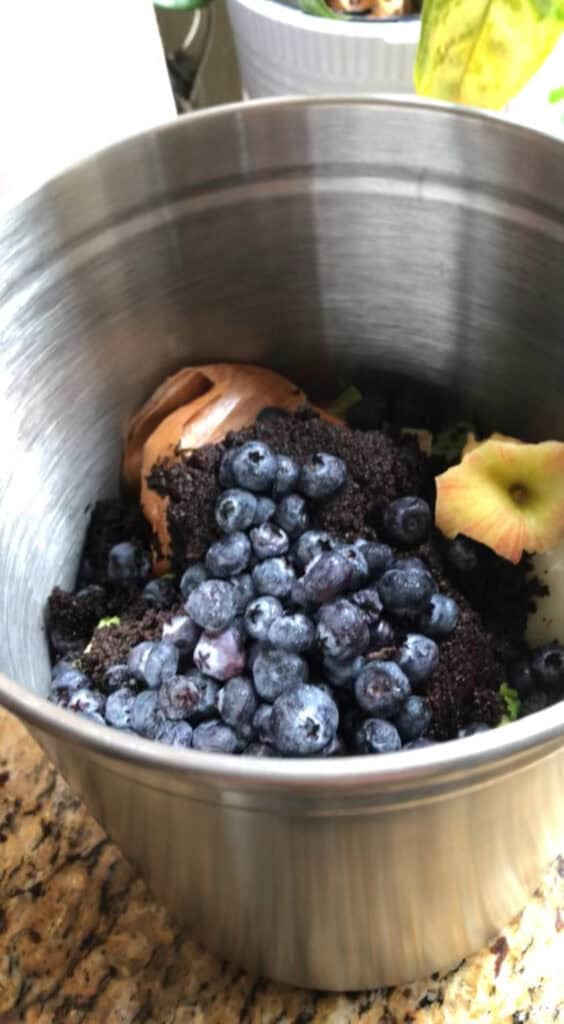
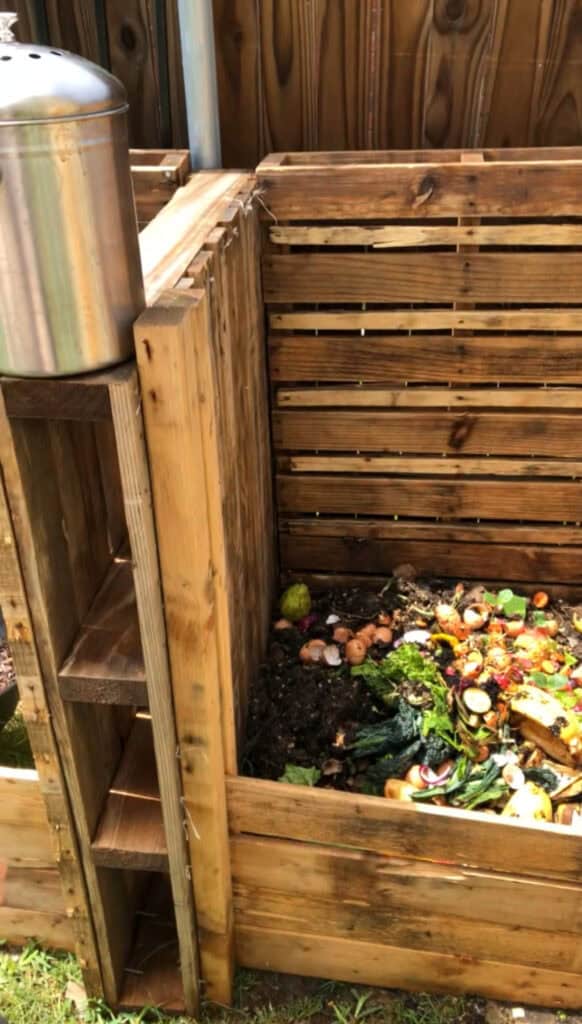
34. Keep chickens: Chickens can eat food scraps and provide eggs, reducing waste and saving money on those expensive eggs. Looking forward to doing this one day!
35. Recycle Properly: Knowing essential recycling rules is key. Be sure to recycle paper, plastic, glass, and metal to conserve resources. Proper recycling makes a big difference!
36. Donate or Sell Unwanted Items: Instead of throwing things away, consider donating or selling them. There are many donation centers out there like Goodwill, The Salvation Army or you can call your local homeless shelter to schedule a drop-off.
37. Avoid Single-Use Items: Choose reusable natural materials over disposables whenever possible. Single-use plastics leave a bigger carbon footprint than people realize.
38. Use Bar Soap: Switching to bar soaps has helped us cut back on so much unnecessary plastic bottle waste.
39. Use eco-friendly shower products: Switching to non-toxic shampoo and conditioner gets rid of harmful chemicals like parabens and reduces plastic waste from disposable bottles. Think of all the ones you have thrown out over the years.
40. Choose Toothpaste Tablets: Toothpaste tablets are pretty cool. You just pop one in your mouth, chew on it until it forms a paste, and then brush away. The can is recyclable and prevents all that waste from those toothpaste bottles.
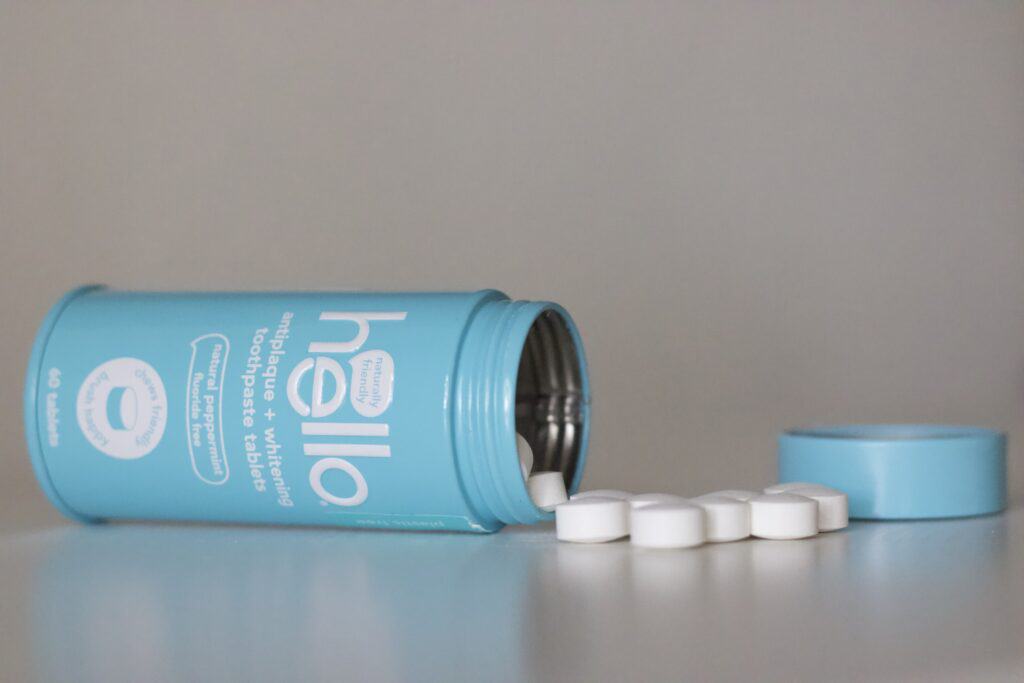
41. Choose bamboo toothbrushes: A much better eco-friendly alternative to those plastic toothbrushes that just contribute to more waste.
42. Avoid Plastic: Plastic production, use, and waste is a huge pollution problem. Many plastics aren’t great for our health either. Choose alternatives when possible.
43. Reduce Paper Usage: Opt for digital receipts, bills, and tickets whenever possible. For example, at grocery stores, we always opt for a digital receipt. This also makes sure you don’t lose it in case you need to return something
44. Use a handkerchief rather than disposable tissues: Handkerchiefs can be washed and reused, reducing waste.
45. Try cloth diapers: This will obviously save you tons of money and reduce a bunch of waste.
46. Breastfeed whenever possible: Another eco-friendly parenting tip that will save you money and reduce waste.
47. Keep your own personal hand towel: Keep this on you at home, work, etc. Reusable towels can reduce the need for disposable paper towels.
48. Let your hands air dry: Instead of using disposable paper towels, let those hands air dry.
49. Use glass or stainless-steel water bottles: Using a reusable water bottle will not only prevent the waste from single-use bottles but better your health too. Recent research has found thousands of microplastics in plastic water bottles which are small enough to travel in the bloodstream to organs including the heart and brain.
50. Use a Reusable Coffee Cup: Many coffee shops offer a discount if you bring your own cup. And no, the coffee shop won’t look at you crazy. They actually love it when people do this! It is VERY common.
51. Use bamboo straws: These are a renewable and compostable alternative to plastic straws.
52. Store leftovers in stainless steel boxes or glass jars compared to plastic containers: These options will keep food fresh longer and won’t leach harmful chemicals. Also, try beeswax wraps instead of plastic wrap.
53. Most dry cleaners will recycle plastic dry-cleaning bags and hangers: Ask your dry cleaner if they have a take-back program.
54. Use rechargeable batteries instead of single-use ones: Rechargeable batteries can be reused many times and cut the need for single-use ones.
55. Refill ink cartridges instead of buying a new one
56. Recycle paper or use it for things like writing notes or making labels: Giving paper a second life!
57. Unsubscribe from paper mailing list: Paper mail is so old school. Opt for digital communications that can replace many paper mailings.
58. Try to fix electronics instead of throwing them away: Give your technology-savvy teenager a project to work on. There are also many shops that offer these services.
59. Recycle Electronics Responsibly: Many electronics stores and local waste facilities offer e-waste recycling.
Kitchen Sustainability Tips
This is where most unnecessary waste can come from. Since making key non toxic kitchen swaps and implementing some of the tips below, we’ve cut down on a lot of kitchen waste.
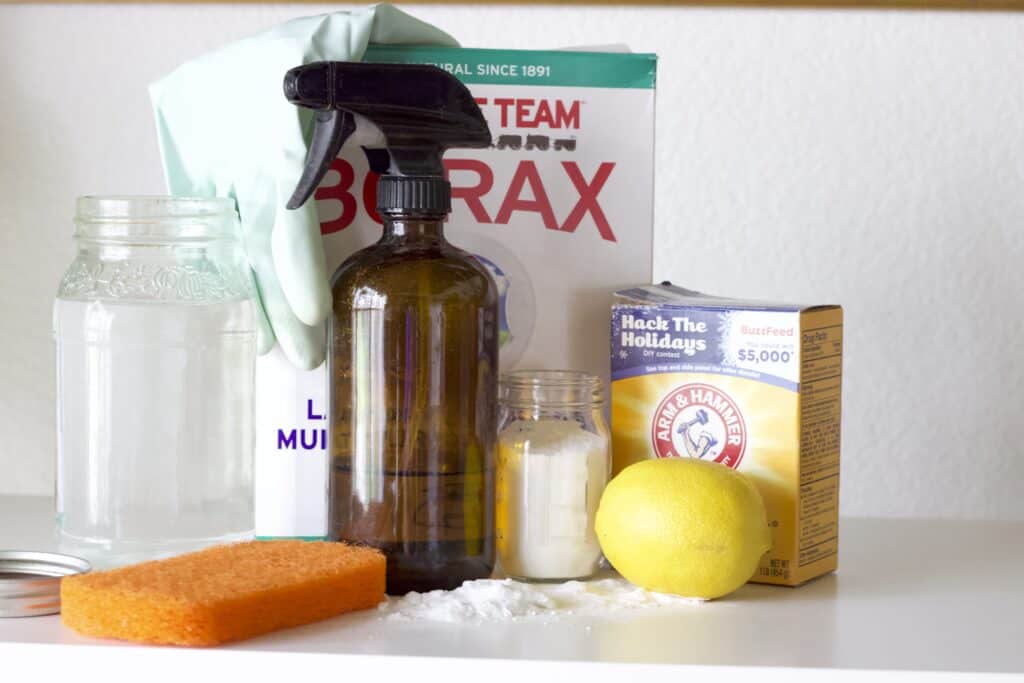
60. Make your own natural cleaning products: Making your own eco-friendly cleaning products is the way to go, for multiple reasons.
It saves money, reduces water pollution from harmful chemicals, minimizes plastic waste, and avoids indoor air pollution caused by VOCs in common cleaning supplies.
61. Choose Non-toxic cookware: A lot of cookware contains toxic PFAS that aren’t any good for you or our environment. Opt for non-toxic cookware, which lasts much longer, uses sustainable materials, and is free from harmful chemicals.
62. Grow Your Own Food: Even a small vegetable garden can help reduce your carbon footprint. We regularly grow our own food like potatoes, onions, bell peppers, tomatoes, carrots, and berries.
With all the chemical fertilizers, pesticides, and growth enhancers used in conventional farming, growing you own stuff is just the way to go. It also saves a bunch of money!
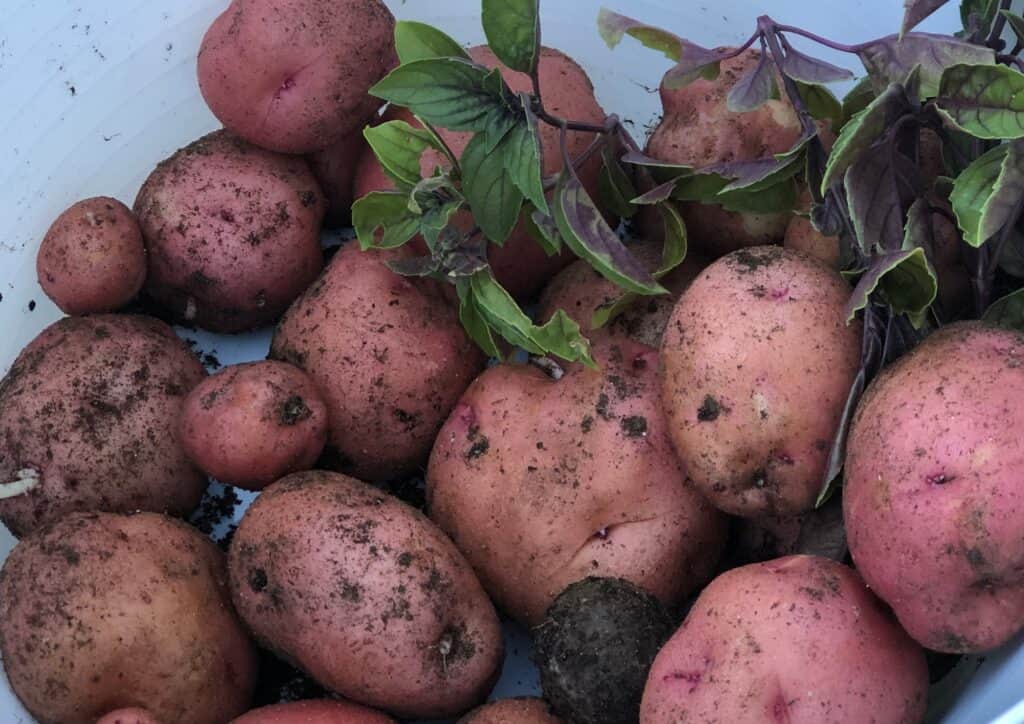
63. Make your own bread: Homemade bread can reduce packaging waste and tastes great! Not to mention all the sugar and random ingredients in store-bought bread. There’s a science to it but you will appreciate the quality of homemade bread once you get it down. We make our own bread almost weekly.

64. Churn your own butter
Haven’t tried this one ourselves yet but are planning to soon!
65. Make your own cheese
Same for this one!
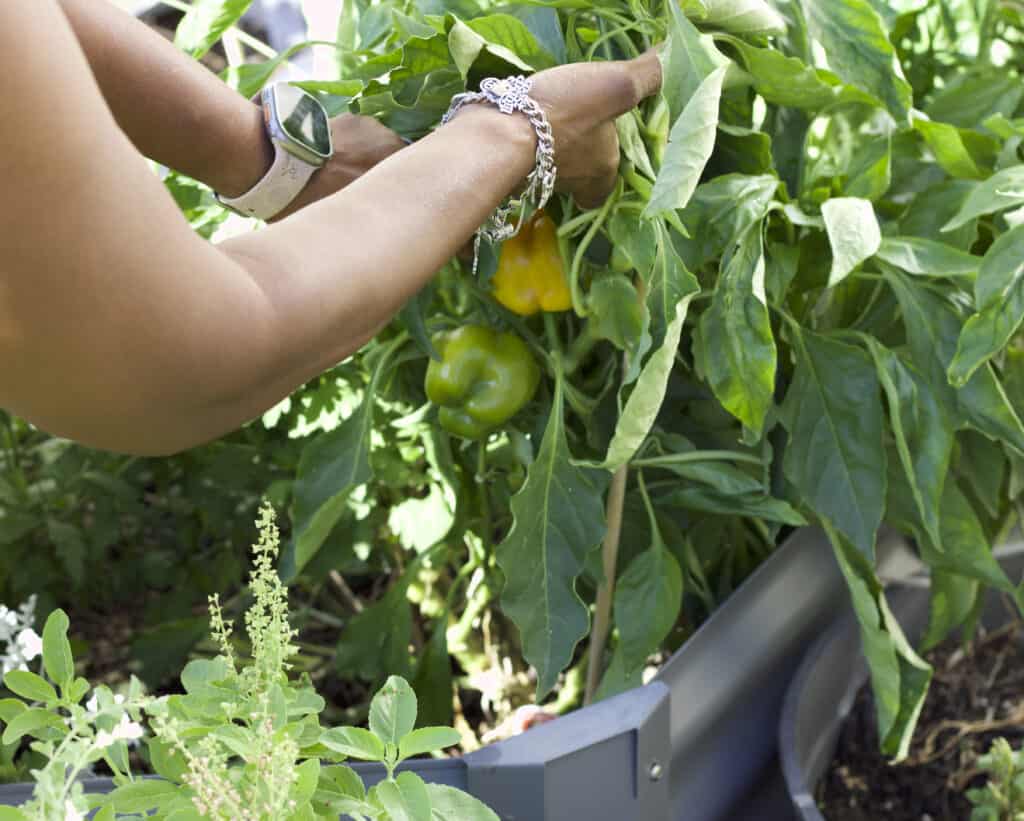
66. Make preserves: Preserving seasonal fruits and vegetables can reduce food waste.
67. Reduce Meat Consumption: This is one that we are working on. While the meat production industry isn’t as horrible as it’s made to seem, it’s still very resource-intensive and contributes significantly to greenhouse gas emissions.
68. Grow herbs on a patio or windowsill: Homegrown herbs reduce the need for transportation and packaging. Check out our little setup below.
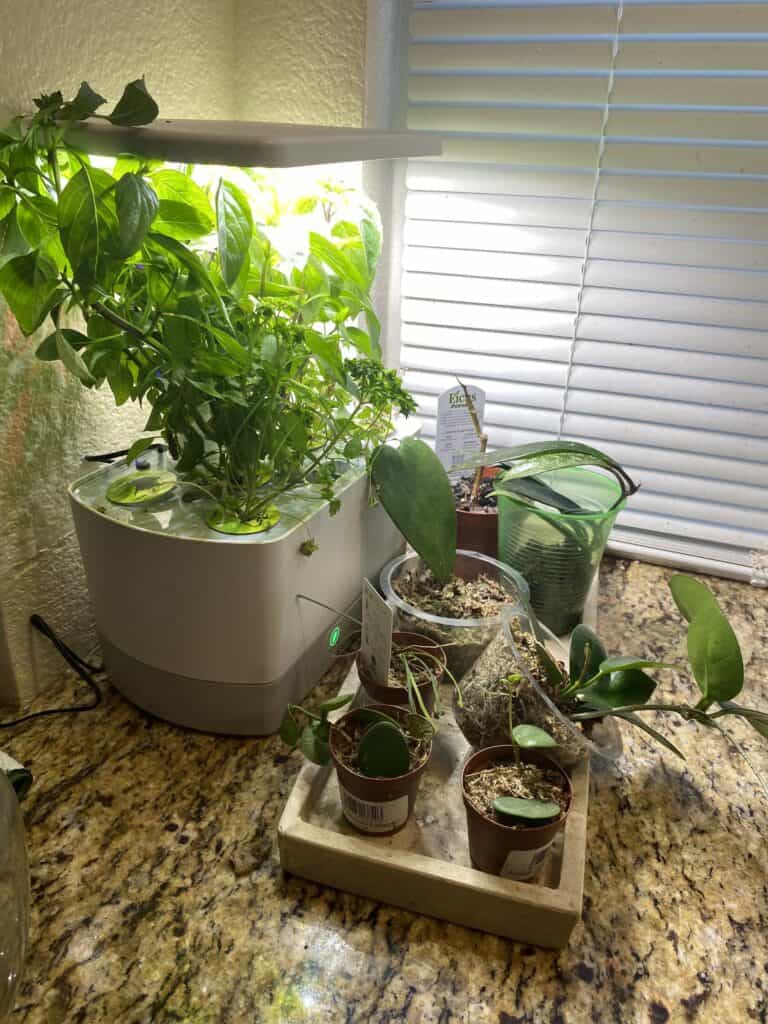
69. Choose glass products instead of plastic: Not only are you avoiding plastic, but glass containers can be reused for many things. They can also be recycled too!
70. Sort the items in your fridge and freezer: Keeping things organized can help prevent food waste. We keep a dry-erase board on the fridge to help us keep track of what we have and what we might need on our next trip to the store.
Extra Home Tips
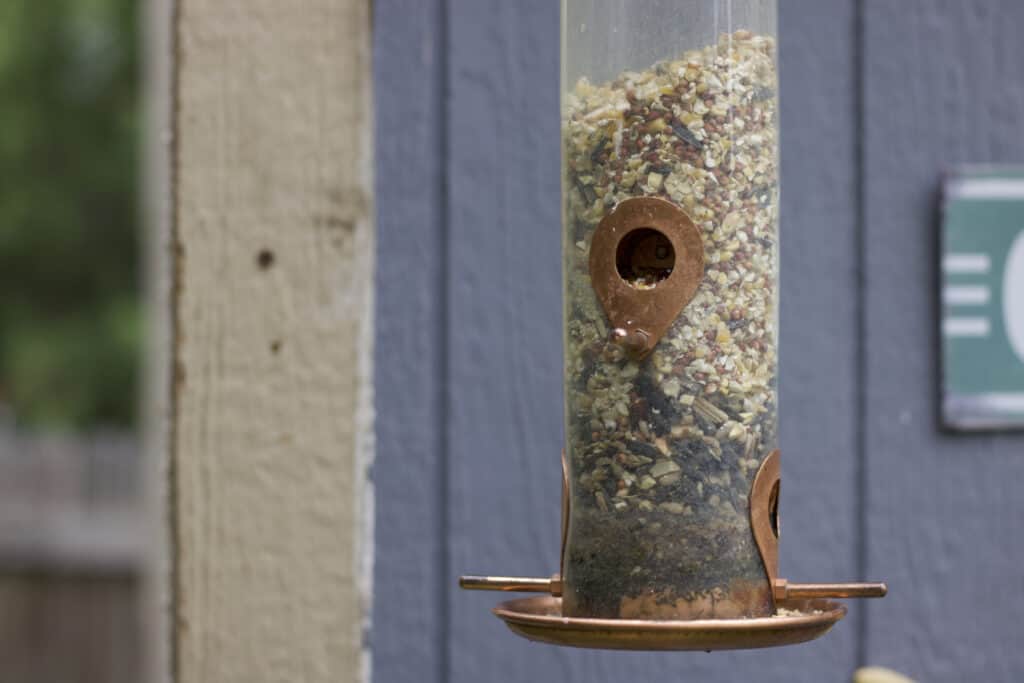
71. Buy organic eco paints: These have a smaller carbon footprint and prevent you and your family from inhaling harmful volatile organic compound (VOCs) gasses that regular paint emits.
VOCs don’t only come from paints either, as they can come from many other sources in your living space. Check out our guide on better air quality at home for more information.
71. Choose Non-Toxic Furniture: Choosing non-toxic furniture for your home reduces exposure to harmful chemicals like formaldehyde, minimizes industrial pollution, and promotes the use of sustainable materials.
72. Create a Wildlife-Friendly Garden: Plants, bird feeders, and water features can attract and support local wildlife. Watching the birds and other wildlife hang out in your own backyard is actually pretty cool!
73. Plant a Tree: If you have space in your yard, consider planting a tree. This not only contributes to absorbing CO2 but also provides shade and habitat for wildlife.

Shopping more Sustainably 🛒
From excessive materialism to the pressures of fast fashion, our shopping habits can contribute to stress and dissatisfaction.
The love for material things hold us back from actions that lead to real, lasting well-being.
Practicing some of the tips below will help you cut down on this bad habit and contribute to a healthier you.
Grocery Shopping
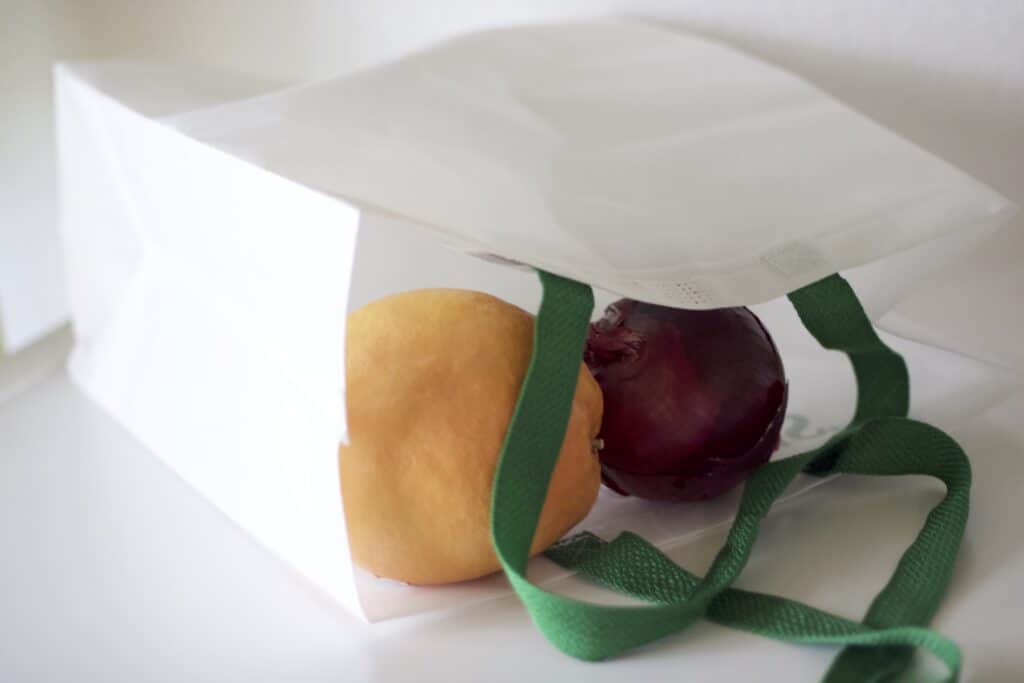
74. Support Sustainable Brands: Purchase from companies that prioritize sustainability in their production and supply chain.
75. Choose Quality: Pick quality over quantity. Buy the items that will last a long time. It might cost more up front but will save more in the long run.
76. Shop fair trade: Fair trade products support better wages and working conditions for producers.

77. Shop Online: This can reduce the gas you waste driving around shopping (and cut carbon emissions). Those delivery trucks are usually passing by your home anyway.
78. Use Your Own Shopping Bags: We got ours from our local market for $1 each. Make the switch to help reduce wasting those plastic bags. If you do end up using plastic bags, most grocery stores will recycle them for you.
79. Use reusable produce bags: Instead of those plastic bags, use these to carry your fruits and veggies. We got ours from Amazon for pretty cheap. They’re washable organic cotton produce bags you can reuse over and over. If you shop at a local market, they usually have bulk bins with grains, nuts, seeds, or beans that you can fill these bags with too.
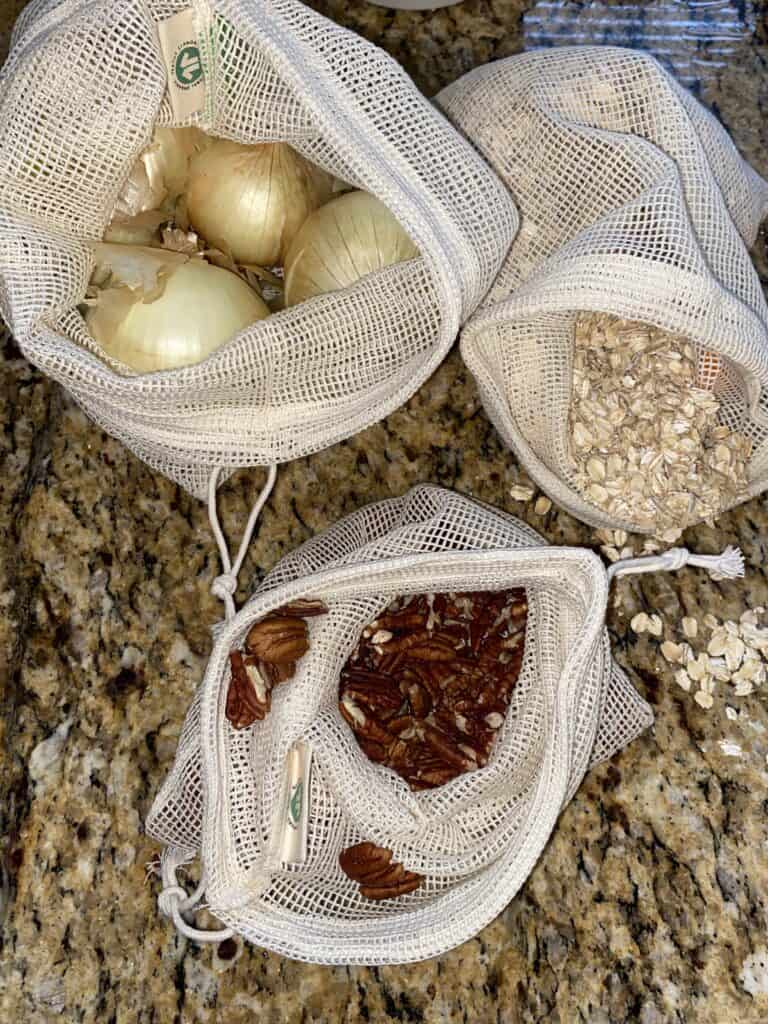
80. Use Eco-Friendly Personal Care Products: Many traditional products contain harmful chemicals that can pollute waterways and harm our health.
81. Shop smarter: Use proper judgment and choose products with less packaging that are made sustainably.
82. Shop at local farmers’ markets: A great way to go green and shop more sustainably. Buying locally produced goods reduces transportation costs, and pollution, and helps support small businesses.
83. Plan meals and make a shopping list: This can reduce food waste and impulse purchases.
84. Buy in Bulk: This can reduce packaging waste. Hello Costco/Sams shoppers.
Sustainable Fashion Tips

85. USE WHAT YOU HAVE: Probably the most important tip on this list. Before you make a purchase, ask yourself, do I really need this? Oftentimes, the answer is no. We are not perfect at this ourselves but boy we have come a long way since adopting this mindset.
86. Shop garage sales: Buying second-hand items can save money and reduce demand for new items. Go to the “fancy” neighborhoods. If you’re on Facebook, check the Facebook marketplace on Thursdays and Fridays. You will find loads of garage/estate sales going on that weekend in your area.
86. Shop thrift stores: We do this all the time and it’s super fun. Hit up different thrift stores in your area and see what you can find. You’d be surprised at the hidden treasures out there!
87. Choose 100% Organic Cotton Materials: Organic cotton is MUCH less harmful to the environment than synthetic fabrics like polyester, which are widely used. It also doesn’t contain all those chemicals that synthetic fabrics do. If you wish to choose polyester, opt for recycled polyester.
88. Use a Capsule Wardrobe: This can cut down on money, time, and the headache having too many clothes can give you (picking out an outfit shouldn’t take that long).
At School
89. Bring your lunch: Packing lunch in your own reusable containers reduces waste from school lunches.
90. Walk or bike to school: No emissions are produced doing this. Easy exercise too! If you’re worried about being smelly at school, bike to school in workout clothes and hit the showers when you get there. Exercise before the day begins always makes it a better day!
91. Reuse old school supplies: Most times there is no reason to buy brand new school supplies every year. The supplies from last year will work just fine.
92. Educate students, parents, and administrators about sustainability: Education can lead to more sustainable behavior at school and at home.
93. Use natural light to light up classrooms and other spaces as often as possible: This reduces the need for electric lighting, saving energy.

94. Study in Natural light: Trust me, we get it! Sometimes you’ll be pulling an all-nighter and you need to keep the lights on… but during the day be intentional about studying in natural light either near a window or outside at a picnic table or even under a tree.
95. Donate your textbooks: Donate or resell your textbooks to other students to help cut down on campus consumption.
96. Go Paperless: Take notes on the computer, study PowerPoint slides digitally instead of printing them out, and buy online textbooks as much as possible.
97. Carpool: Travel with friends instead of driving separate cars. This improves relationships too!
98. Walk or Bike around campus: Get your steps in on campus when going from class to class or breaking for lunch.
99. Join Sustainability Clubs: These kinds of clubs are becoming more popular on college campuses as the stride towards a greener future grows.

At Work
100. Choose Sustainably Technology: Choose energy-saving technology to not only save energy but also cut back on the electric bill.
101. Package and ship your products using sustainable materials: Choose packaging materials that are recyclable or composted.
102. Give back to your community: Businesses can (and should!) support local initiatives and charities.
103. Encourage and provide remote work opportunities: Letting employees work from home can reduce commuting emissions (and make their lives easier).
104. Maintain a credible sustainable business certification: This can demonstrate commitment to sustainability and improve your reputation.
Other Sustainability Tips
Our list of sustainable tips continues to grow! As we learn more, we’ll continue to add to this list.

105. Learn to sew: A lost art we need to make popular again. Repairing old garments or giving them a new purpose can extend their life and prevent the need to purchase new ones. We keep a sewing kit on stand by.
106. Participate in Local Clean-ups: Joining community efforts to clean local parks, beaches, or streets can help improve your local ecosystem. Get the kids involved!
107. Educate Others About Sustainability: Sharing your knowledge and passion for sustainability can inspire others to act as well.
108. Take Advantage of Public Transportation: Using public transport like buses, trains, or trams can significantly reduce your carbon footprint.
109. Carpool or Bike to Work: Sharing a ride or biking can reduce emissions and save fuel.
110. Eat at Home: This is beneficial for many reasons. It’s much better for your health, saves money, and reduces all those plastic containers that come with your take-out food.
111. Electric Vehicles: There’s no debate. Electric cars do have a lower carbon footprint compared to gas cars. If you can afford it, this is the way to go. If you can’t afford an electric car, opt for a car that uses less gas.
112. When gifting, give an experience: Buy someone a ticket to somewhere rather than spend money on a gift they might not be using in a month or two.
113. Vote: The most important tip on this list. Be sure your vote goes toward helping sustain our world and most importantly the health of the people in it.
114. Choose Eco-Friendly Exercise Equipment: Opt for non toxic exercise equipment that doesn’t smell like chemicals and lasts much longer than equipment built with cheap materials.
Comment with any tips you know that we might have missed!
Check out some of our other posts below!



